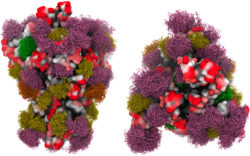For over a year, the Georgia Theatre marquee read: “Longest set break ever.” As the pandemic dragged on last year, the empty, silent stages were deafening, especially for a city whose music scene is so integral to its unique character and charm.
In the last year and a half, the Athens music community has been creative and has found new ways to bring music to people, like Zoom concerts and socially distanced outdoor shows. Over the summer, with fewer students in town, cases dropped, and it looked like maybe Athens was on a path to the end of the pandemic. The music scene slowly came back to life, with the Georgia Theatre and other venues like the 40 Watt Club, Flicker Theatre & Bar, Nowhere Bar and Little Kings Shuffle Club announcing August dates.
Sadly, in a matter of weeks it has become clear that the much more contagious Delta variant can still be spread by those who have been vaccinated. The CDC has changed its recommendations on masking, and ACC has reinstated its mask mandate. While some bars have opted out of the mandate by posting a sign stating they don’t consent to enforcement, most music venues are requiring masks. Many venues—including the 40 Watt, Hendershot’s, Flicker, Nowhere Bar and AEG Presents, the national company that manages the Georgia Theatre— went a step further and are now requiring either proof of vaccination or a negative COVID test within the past 48 hours for live shows. As of Oct. 1, the negative test won’t be enough at the 40 Watt or the Georgia Theatre—only a vaccine card or a photo of it will get you in.
Another venue, the 100-capacity Lewis Room, is also requiring a negative COVID test result or vaccination proof. Relatively new to the scene, it’s a part of Tweed Recording, a studio and school that offers an 18-week intensive audio recording training program. The decision on live show protocol was made to keep students safe and avoid interrupting their education by missing classes, according to owner Andrew Ratcliffe.
“The majority of us [at Tweed], in a way, started a band to kind of fight back against the man, and now all of a sudden we’ve become the man,” he said. “There’s a lot of responsibility in that. We have to be careful that if we start demanding things too soon that we’re playing with peoples’ livelihoods.”
Bands and venues are having to pivot and adjust very rapidly to the evolving situation, Ratcliffe said. “It’s a 500-mile moving target, and it’s changed dramatically in just the last 72 hours. It looks like we’re right back where we were a year ago.”
David Barbe, a longtime local musician and director of the University of Georgia’s Music Business Program, said he thinks such protocols are the right move.
“I applaud the local venues for putting a mask policy in place. Anything we can do as a community to reactivate our stages is something I am absolutely in favor of,” Barbe said. “I have great respect for national touring artists who are requiring a negative COVID test or vaccination proof. They are keeping the rest of their fans safe and keeping their bands on the road. If this costs an artist some fans who object, those fans will just be replaced by new people who are appreciative of why artists are doing this and potentially jeopardizing their popularity with fans who disagree.
“Jason Isbell is a good friend of many years. He was one of the first to do this and has really taken some heat. I am proud of him standing up for what he believes.”
Isbell, formerly of Athens’ Drive-by Truckers, recently spoke out about why he decided to require vaccination proof or a negative test to attend his concerts. “If we hadn’t put these kinds of restrictions in place and we didn’t hold the line on it, I would feel like I was taking advantage of people while I’m doing my job,” he told Rolling Stone last week.
In addition to local venues and the jobs they support, the pandemic is also hurting Athens-based touring bands like Widespread Panic, of Montreal, The Pink Stones and Futurebirds, Barbe added. “All of these touring groups have essentially been out of work since early last year,” he said. “They love creating their art and expressing themselves on stage, but it’s also their jobs. It’s how they feed their families. They need to get back to work just like everybody else who has suffered economic hardship in the last year and a half.”
What makes decisions on COVID protocols so difficult, Ratcliffe said, is the lack of a standard metric. No matter what one does, there will always be people who disagree. “We’re setting ourselves up to just rip this country apart and have no music,” he said.
Delta Is Spreading Fast
For now, venues and festivals like AthFest are left to consider the rapidly changing pandemic. Cases have risen rapidly in Clarke County over the past six weeks, and the start of K-12 and UGA classes could lead to increased spread. Almost 100 Clarke County School District students and staff tested positive for COVID last week. The University System of Georgia still is not requiring masks or vaccinations at UGA despite pleas from faculty, staff and the Clarke County Board of Health.
While Athens serves as a regional health care hub, when the hospital beds are full here, rural hospitals without ICU units or nurses with specialized intensive care training are forced to make do. Brandon “Kip” Hicks, an emergency room physician at St. Mary’s Hospital, said the situation is dire. Hicks recently volunteered to help out at one of St. Mary’s sister hospitals, Good Samaritan Hospital in Greensboro, that was overwhelmed, and the scene there was unlike anything he’d seen thus far in the pandemic. The hospital was full of patients needing care, and there was nowhere to send those who needed more intensive care at the time.
“Things are pretty bad right now. It’s as bad as it was at any time before,” Hicks said. “To compound everything right now, a lot of hospitals are dealing with nursing shortages.”
St. Mary’s CEO Montez Carter was similarly candid about the grim outlook for hospitals all across the state.
“We continue to see steady growth in the number of patients coming to our hospitals with serious COVID illness. Disturbingly, far more patients in this surge are in their 30s, 40s and 50s than in previous surges. As of this morning, nearly half of our system’s COVID patients are under 60, and the vast majority have not been vaccinated,” he said. “Like most hospitals in Georgia, we are experiencing overcrowding in our emergency departments and critical care units on a daily basis, and the situation is growing more stressful day by day. EMS diversion has become a frequent occurrence at both Athens hospitals, which means EMS rotates between us. We continue to see and treat all who come to us for care, but those with minor complaints can expect longer wait times than normal.”
Piedmont Athens Regional executives also emphasized that almost all the patients hospitalized with COVID-19 are unvaccinated, and they tend to be younger than during previous waves.
“This virus has already mutated multiple times, and there is an increased chance for more contagious strains of COVID-19 to emerge the longer our community remains under-vaccinated and the pandemic continues. And although we hear of rare cases of vaccinated individuals getting COVID-19, they are usually asymptomatic and do not require hospitalization, unlike those who are unvaccinated,” Athens Regional CEO Michael Burnett and Chief Medical Officer Robert Sinyard said in a joint statement.
To keep audiences safe, coax back reluctant fans and avoid legal liability and potentially another shutdown, Barbe advised extra caution. “The really difficult legal issue is going to be venues and artists who could be held liable for an audience that gets sick at their show,” he said. “If for no other reason, this should be enough to put vaccine, mask and negative test standards in place for live shows,” said Barbe. “It is just smart business. This in addition to not wanting to be responsible for accelerating the spread of an infectious disease that is a threat to unvaccinated children.”
As AthFest approaches in September, Carter, at St. Mary’s, hopes that organizers, audiences and businesses will take the necessary precautions. “We urge event organizers to follow those CDC guidelines in their venues, especially as we learn more about the Delta variant and how easily it can spread through the air,” he said. “It is essential that everyone returns to the measures we have seen repeatedly stop surges: wearing a mask, maintaining social distance, washing hands and getting vaccinated.”
If the surge continues, it’s possible AthFest could be canceled for the second year in a row. Athens-Clarke County officials will make a final decision in early September on whether the festival can move forward. Assuming it does, at least one commissioner, Melissa Link, is pushing for a mask mandate, as well as proof of vaccination to enter beer tents.
For Barbe, the very fabric of Athens’ music scene hangs in the balance. Vaccines, he said, are the way out. “I hear a lot now about Athens changing, and a fear that downtown is losing its unique character. If this [pandemic] costs Athens our venues, and our bands all have to find some other way of living, then we all lose,” he said. “I am hopeful that this latest wave of Delta variant cases and the impending FDA approval [full authorization] of the vaccine will inspire more people to get the vaccine.
“Look, I would prefer not to wear a mask, but it seems like an awfully small price to pay when I look at the bigger picture.”
Beyond Athens’ local scene, Lollapalooza required vaccination proof or a negative COVID test this summer, and Bonnaroo also announced that a negative COVID test or vaccination proof would be required. Some bars and venues in Atlanta are also taking this route.
“I want to be optimistic, but everything is back up in the air now,” Barbe said. “We are starting to see festivals cancel. On the one hand, those are potential super-spreader events, and the promoters don’t want the liability. The fear here is that this will trickle down to the local club level. Let’s just say that I am hopeful but realistic that without a greater buy-in to vaccination and masks that live music could once again suffer.”
Like what you just read? Support Flagpole by making a donation today. Every dollar you give helps fund our ongoing mission to provide Athens with quality, independent journalism.










